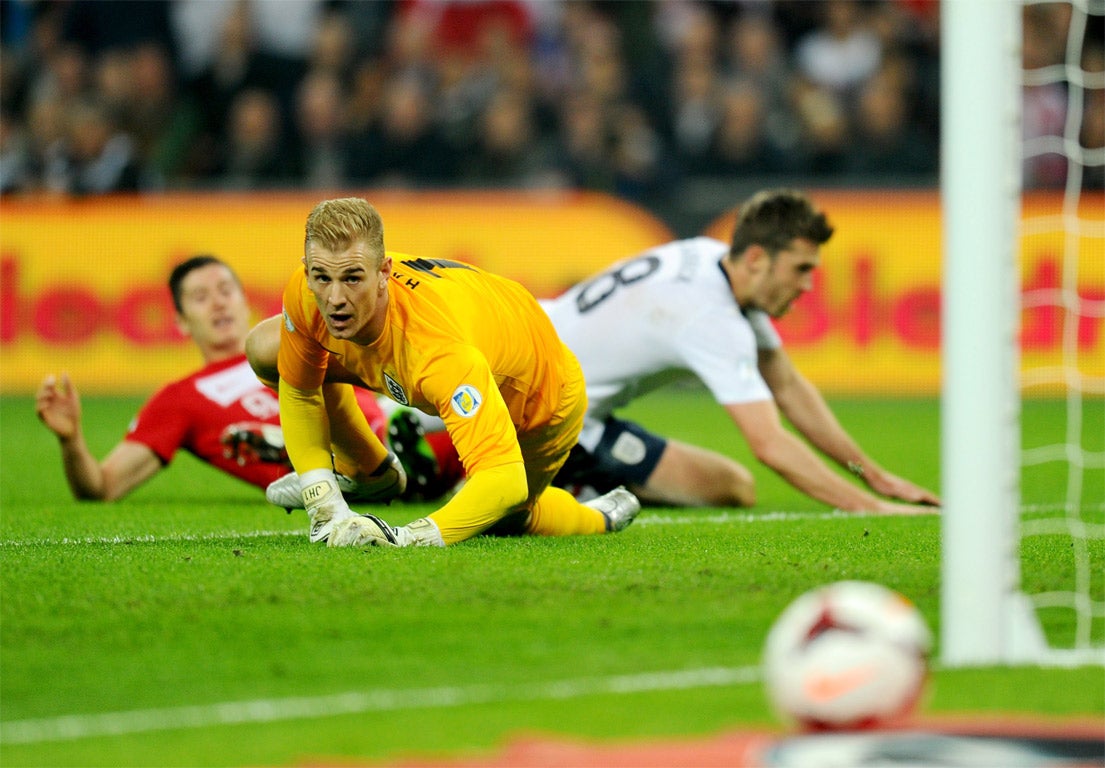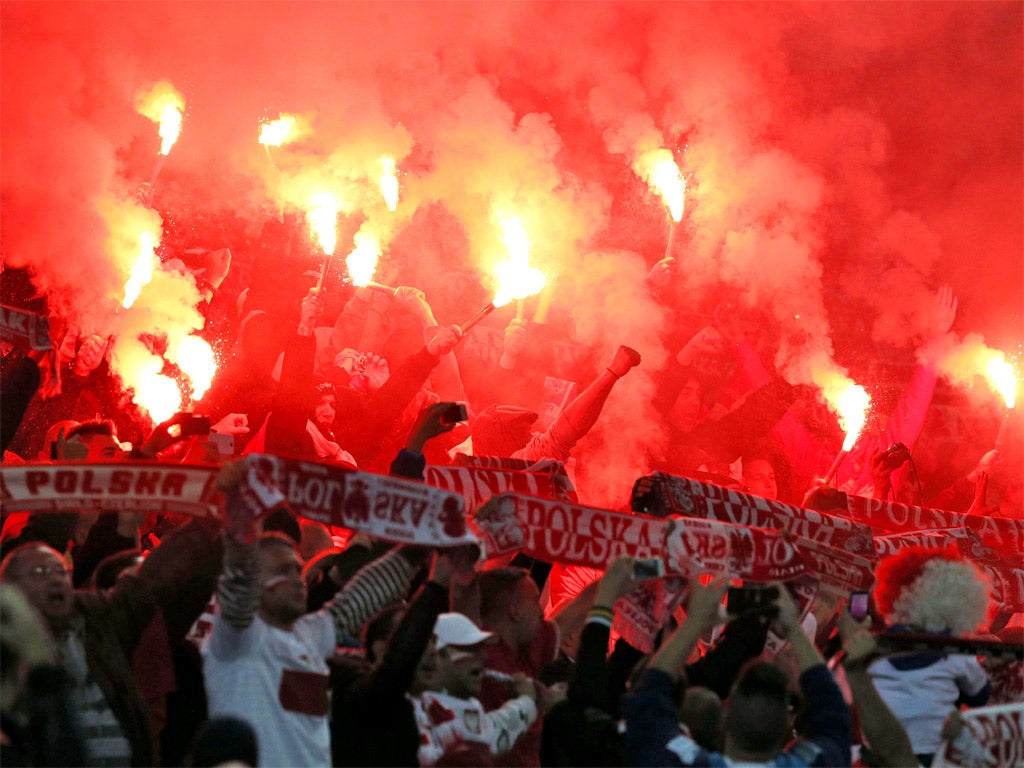Comment: England remove shackles of fear in victory over Poland to banish schoolboy nightmare
The ranks of Polish citizenry created the best atmosphere ever under the arch

Your support helps us to tell the story
From reproductive rights to climate change to Big Tech, The Independent is on the ground when the story is developing. Whether it's investigating the financials of Elon Musk's pro-Trump PAC or producing our latest documentary, 'The A Word', which shines a light on the American women fighting for reproductive rights, we know how important it is to parse out the facts from the messaging.
At such a critical moment in US history, we need reporters on the ground. Your donation allows us to keep sending journalists to speak to both sides of the story.
The Independent is trusted by Americans across the entire political spectrum. And unlike many other quality news outlets, we choose not to lock Americans out of our reporting and analysis with paywalls. We believe quality journalism should be available to everyone, paid for by those who can afford it.
Your support makes all the difference.Thank you, Poland. Thank you for drawing out of England a performance that proved how good a side they can be when provoked. Thank you for a send-off to Brazil that suggests a party might be had. Thank you for releasing a generation of schoolboys from the trauma of defeat 40 years ago and thank you for the atmosphere that turned Wembley into a genuine football experience once more.
This was a night that turned the clock back in more ways than one. For a spell in the first half England rediscovered a sense of freedom that seemed forever lost. Generations of running in straight lines, of playing stiff, formulaic football was shunted into history. Roy Hodgson promised the end of fear, and after a watchful start during which Poland might have taken the lead, his team produced arguably the most persuasive argument yet that English footballers speak the lingua franca of the continental game.
For those old enough to remember that night in 1973, the prospect of a Polish win could never be discounted given the degree of scarring that remains. The positive noises coming out of the England camp beforehand were noted but insufficient to erase the feeling associated with the end of empire, for that is what it was. England was in the grip of political crisis, national strikes, energy cuts and the lights went out on the football team. Welcome to school boy hell and to international purgatory for England, who have yet to return to the summit of the game. Perhaps this was a step up that ladder.
This would be a serious test of their credentials, needing to win against a team with nothing to lose and made to feel at home by a raucous following. The Poles were not shy, Robert Lewandowski running at the heart of the English defence in a series of quick, early raids. Waldemar Sobota rattled the side netting in another brisk attack before the quarter-hour was up.
In the best traditions of foreign opposition Poland had a way of making the pitch small, each attack a raiding party of rapid feet and short passing. As against Montenegro in the early stages, England were more reliant on ancient patterns seeking to breakthrough from wide positions.
Poland simply cut off the supply and hit on the counter. Lewandowski should have put Poland ahead in the 23rd minute after another clever move freed him down the left, leaving him clean through on Joe Hart. No one's perfect. His shot skimmed wide.
All of this unfolded in a cauldron of Polish making, the massed ranks of Polish citizenry creating the best atmosphere witnessed under the arch. Lewandowski's miss proved the switch that tripped England into meaningful life. The English footballer is a dangerous beast when liberated from the formality that for too long has been present in this setting. Andros Townsend cut inside from his station on the right to curl a thunderbolt against the bar with his left foot. Suddenly England were a kaleidoscope of movement in front of goal and the Polish box was 1973 all over again, the ball ricocheting of defensive body parts left, right and centre.

Forty years ago there was no Wayne Rooney, or Leighton Baines for that matter. This night could not have helped heal Ashley Cole's aching ribs, Baines being a triumph from first to last, symbolised by the beautifully shaped cross that picked out Rooney's willing forehead for a goal that crowned England's flowering authority.
To their credit there was no shrinkage in output after the break from this honest Poland side. Indeed, as the second half wore on with England's advantage still slender there was more than a whiff of danger in the air, which makes you wonder what the members of the Polish diaspora assembled here thought of the depiction of their country.
The programme was awash with nostalgia for 1973, reducing the history of Polish soccer to one night at Wembley. Poland, who won Olympic football gold at Munich the year before, progressed to the World Cup finals in Germany, where they were good enough to finish third and in the shape of the great Grzegorz Lato claim the Golden Boot. Yet the commentary was suffused by English hauteur that pitched the visitors as some kind of larcenists, the theft of World Cup qualification from mighty England an affront to football values.
Like any minority group concentrated in number far from home there was an awful lot of display behaviour going on. Look at me I'm Polish. Their national identity was projected through every pore along Wembley Way, where thousands proclaimed their pride in Polska shirts, exaggerated top hats and scarves. Three hours before kick-off, 90 minutes before the gates opened London had its very own Polish quarter temporarily colonising Wembley. Well, the capital is home to 150,000 Polish nationals, making it the 24th largest Polish city in the world.
But theirs was a welcome presence in a stadium that struggles to replicate the atmosphere of Premier League grounds. There was nothing riding on the result for them, just the opportunity to indulge in a shared experience and maybe remind the hosts of the calibre of the Polish footballer.
The Polish 'end' was the quickest to fill, and if points were awarded for banners, Poland would have romped home. The celebration of the Polish anthem was so profound it demands a recount of tickets sold. Can 18,000 really make that much noise? There was no diminution in volume thereafter.
With 20 minutes to go Hodgson sent on Frank Lampard for Michael Carrick, who had been a factor in the improved movement of the team. The second half never quite matched that latter part of the first but that didn't matter when Steven Gerrard poked England across the line in the dying minutes.
The hope must be that Hodgson can bottle this elixir. To be clear no one is talking world beaters here. It is enough that England at last resembled a team that knew what is was doing, looked convincing in the process and made the crowd believe. Brazil here we come.
Join our commenting forum
Join thought-provoking conversations, follow other Independent readers and see their replies
Comments